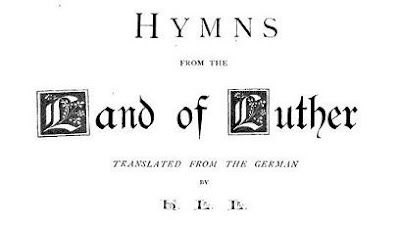Borthwick's family belonged to the Free Church of Scotland, and she apparently became interested in German-language hymns during a trip to Switzerland, where a friend suggested that she try translating them. After returning to Scotland, her father also encouraged that idea. Jane and her sister, Sarah Borthwick Findlater, worked over the next several years and eventually brought out four volumes titled Hymns From the Land of Luther between 1854 and 1862. The total number of translated hymns was 122; 69 by Jane.
This Borthwick translation of a text by Count Nicholas von Zinzendorf first appeared in The Free Church Magazine in 1846, and was slightly revised for the first volume of Hymns From the Land of Luther.
Jesus, still lead on,
Till our rest be won,
And, although the way be cheerless,
We will follow calm and fearless,
Guide us by your hand
To your promised land.
If the way be drear,
If the foe be near,
Let no faithless fears o’ertake us,
Let not faith and hope forsake us,
For through many a woe
To our home we go.
When we seek relief
From a long felt grief;
When temptations come alluring,
Make us patient and enduring;
Show us that bright shore
Where we weep no more.
Jesus, still lead on,
Till our rest be won;
Heavenly Leader, still direct us,
Still support, control, protect us,
Till we safely stand
In your promised land.
Nicholas von Zinzendorf, 1721
tr. Jane Laurie Borthwick, 1846; alt.
Tune: SEELENBRAUTIGAM (5.5.8.8.5.5.)
Adam Drese, 1698
The four volumes of translated texts were attributed to "H.L.L.," a pseudonym shared by the sisters. Borthwick also published other books of poetry and original hymn texts as well as books of religious instruction for children as H.L.L. She was apparently quite unhappy when her real identity was revealed by hymn compiler Charles Rogers in Lyra Britanica, a Collection of British Hymns (1867).
Her most famous translation today is certainly Be still, my soul, which became much more popular after 1933 when it was first matched with the tune FINLANDIA, which was adapted from a portion of the instrumental tone poem of the same name by Finnish composer Jean Sibelius. Her most known original text may be one we have already seen here: Come, labor on.

No comments:
Post a Comment